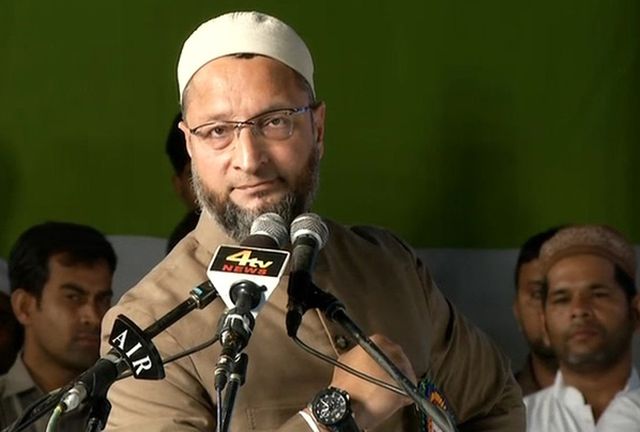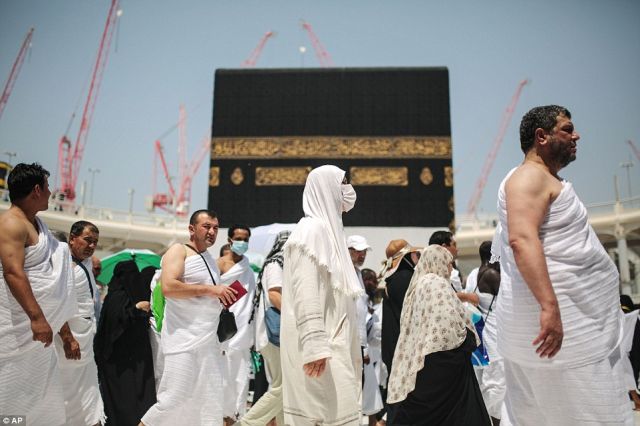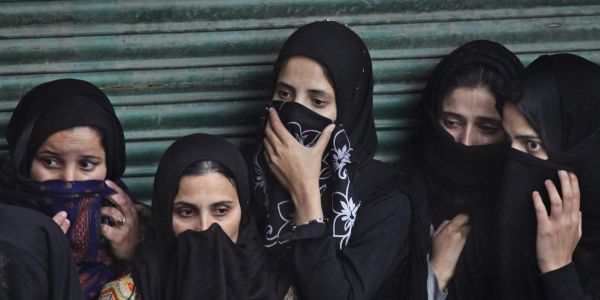
by Editor | May 25, 2021 | News, Politics

Asaduddin Owaisi
Hyderabad : MIM chief Asaduddin Owaisi on Monday rejected claims by Prime Minister Narendra Modi that he had facilitated Muslim women’s travel for Haj without ‘Mahram’.
The Hyderabad MP said that a regulation by Haj authorities of Saudi Arabia was in force for many years which allow women above the age of 45 years to perform Haj without a ‘Mahram’ if they travel with a group.
He told reporters here that women above 45 years of age from Indonesia, Malaysia and several other countries had been performing Haj under this Saudi regulation.
‘Mahram’ is a male relative of a woman with whom she is permanently forbidden to marry by Islam.
Modi in his ‘Mann Ki Baat’ speech on Sunday had said that his government had removed the restriction which allows Muslim women to perform Hajj only in the company of ‘Maharam’. He had stated that injustice was done to women for decades.
“It has become the habit of the Prime Minister to claim credit for everything. If tomorrow women in Saudi Arabia are allowed to drive, he will claim credit for the same,” he said.
The MP said if Modi had so much concern for Muslim women, he should do justice to Zakia Jafri, widow of former MP Ehsan Jafri who was killed in the 2002 Gujarat riots.
“This is all tokenism. If Modi is really concerned about Muslim women, he should provide 7 percent reservation for them in education. He has two-third majority in Parliament and he can bulldoze a bill in this regard,” the MP said
On the passing of a bill in Lok Sabha over triple talaq, the Majlis-e-Ittehadul Muslimeen (MIM) President said that if it became a legislation, it would be the biggest injustice to Muslim women.
He argued that since marriage in Islam was a civil contract, there could be no penal provision. He also pointed out that the Supreme Court in its order on the issue did not ask the government to bring a criminal law.
“The government is saying that Muslim countries have banned triple talaq but the fact is that there is no penal provision in any Muslim country.”
Owaisi alleged that the real objective of the government was to do away with all forms of talaq and snatch Sharia from Muslims.
The MP said abandonment of married women was a bigger problem than divorce.
“The rate of abandonment is twice the rate of divorce. There are 24 lakh abandoned women and they include 20 lakh Hindu women, two lakh Muslim and 90,000 Christian women,” he said.
“The married women should get their right to live with their husbands whether they are in Gujarat or in Delhi,” he said.
—IANS

by Editor | May 25, 2021 | News, Politics
 New Delhi : In a bid to empower Muslim women, the government has changed the law by permitting them to travel for the annual Haj pilgrimage without any male attendant, Prime Minister Narendra Modi said on Sunday.
New Delhi : In a bid to empower Muslim women, the government has changed the law by permitting them to travel for the annual Haj pilgrimage without any male attendant, Prime Minister Narendra Modi said on Sunday.
“I noticed that if a Muslim woman wanted to go for the Haj pilgrimage, they cannot go without a ‘Mahram’ (a male guardian),” Modi said in 2017’s last edition of his radio programme ‘Mann Ki Baat’.
“And when I enquired about it, I came to know that it was we who have have restricted them for going alone for the Haj. This practice is not followed in many of the Islamic countries,” he said.
Modi added that the Minority Affairs Ministry has removed this restriction and will now allow the Muslim women to travel to Haj without a male attendant.
“Till date, 1,300 women have applied to travel for the Haj without any Mahram,” the Prime Minister said, adding that “they should get equal opportunity as the men get”.
—IANS

by Editor | May 25, 2021 | News, Politics
 By Anjali Ojha,
By Anjali Ojha,
New Delhi : The proposed bill that criminalises the practice of instant divorce “empowers” Indian Muslim women by giving them a larger say in dissolving marriages, custody of minor children and the right to seek maintenance from their estranged husbands, according to the cabinet-cleared controversial legislation opposed by Muslim groups.
The bill defines triple talaq as “any pronouncement (of divorce) by a person upon his wife by words, either spoken or written or in electronic form, or in any other manner”. It proposes to make the practice a punishable offence and is set to be introduced in the Lok Sabha next week.
IANS has exclusive access to a copy of the cabinet-cleared version of the legislation drafted after the Supreme Court’s decision against the gender-discriminatory practice that is not followed even in major Muslim countries, including Saudi Arabia, Egypt and Pakistan.
The draft bill says the practice against “constitutional morality” and “gender equity” is to be considered “void and illegal”.
Anyone who pronounces instant divorce “shall be punished with imprisonment for a term which may extend to three years and a fine”, the bill proposes.
In its statement of objects and reason, the draft mentions the landmark Shayara Bano case in which the Supreme Court invalidated the practice of instant triple talaq. The statement would be read by Law Minister Ravi Shankar Prasad when he introduces the bill in the Lok Sabha to explain why the government had to formulate the legislation.
Shayara Bano, a 38-year-old woman from Uttarakhand, fought a long legal battle seeking an end to the the patriarchal custom after she claimed to have suffered for 14 years in her marriage.
“This judgement gave a boost to liberate Indian Muslim women from the age-old practice of capricious and whimsical method of divorce, by some Muslim men, leaving no room for reconciliation,” the minister says in the bill’s statement of objects.
The judgment vindicated the position taken by the government that “talaq-e-biddat”, which allows men to pronounce divorce thrice in one sitting, is against “constitutional morality, dignity of women and the principles of gender equality, as also against gender equity guaranteed under the Constitution”.
Clerics and several Muslim organisations, cutting across sects and schools of jurisprudence, protested against the Supreme Court judgment and termed the government’s stand as “uncalled for interference” in the personal laws of the community.
Ravi Shankar Prasad, however, in the bill’s objects and reasons says the All India Muslim Personal Law Board (AIMPLB), which was also a respondent in the Shayara Bano case, had contended that it was not for the judiciary to decide matters of religious practices such as talaq-e-biddat but for the legislature to make any law on the same.
“They had also submitted in the Supreme Court that they would issue advisories to the members of the community against this practice,” the minister explains.
The bill notes that “there have been reports of divorce by way of talaq-e-biddat from different parts of the country” even after the Supreme Court invalidated the practice and the assurance by AIMPLB.
“It is seen that setting aside talaq-e-biddat by the Supreme Court has not worked as any deterrent in bringing down the number of divorces by this practice among certain Muslims. It is, therefore, felt that there is a need for State action to give effect to the order of the Supreme Court and to redress the grievances of victims of illegal divorce,” the minister says.
The bill states that urgent suitable legislation was necessary “to give some relief to…the hapless married Muslim women who suffer from harassment due to talaq-e-biddat.
“This is essential to prevent this form of divorce, wherein the wife does not have any say in severing the marital relationship.
“The legislation would help in ensuring the larger constitutional goals of gender justice and gender equality of married Muslim women and help subserve their fundamental rights of non-discrimination and empowerment.”
(Anjali Ojha can be contacted at anjali.o@ians.in)
—IANS

by Editor | May 25, 2021 | News, Politics
 New Delhi : A bill on making Triple Talaq a punishable offence and another one to give constitutional status to the backward classes panel is set to be introduced in the Lok Sabha next week, Parliamentary Affairs Minister Ananth Kumar said on Thursday.
New Delhi : A bill on making Triple Talaq a punishable offence and another one to give constitutional status to the backward classes panel is set to be introduced in the Lok Sabha next week, Parliamentary Affairs Minister Ananth Kumar said on Thursday.
The Muslim Women (Protection of Rights on Marriage) Bill, 2017, provides for three-year imprisonment and fine for men who orally divorce their wives and also gives such Muslim women the right to seek maintenance.
The Constitution (123rd Amendment) Bill pertains to conferring constitutional status on the National Commission for Backward Classes.
The bill, passed by the Lok Sabha in April, was sent to the Rajya Sabha which passed the bill with amendments. Hence, the government will now reintroduce the bill.
“In case of a constitution amendment bill, the Lok Sabha and the Rajya Sabha cannot differ. So the bill has to be reintroduced,” the Minister said.
Government sources said some minor changes were made to the bill.
—IANS

by Editor | May 25, 2021 | News, Politics

Bharatiya Muslim Mahila Andolan (BMMA)
Mumbai : The Bharatiya Muslim Mahila Andolan (BMMA) on Friday urged all opposition leaders, including Congress President-elect Rahul Gandhi, to extend their support for the proposed Muslim family law.
In a letter to Gandhi and other major Opposition parties, the BMMA founders – Zakia Soman and Noorjehan Niaz – said that although the Supreme Court has struck down ‘Triple Talaq’ in its judgement last August, other issues like ‘nikah halala’, polygamy, age of marriage, custody of children, etc, remain unaddressed.
The BMMA has been actively raising these issues to end the legal discrimination and demanding justice and equality in family matters which are orthodox, patriarchical and male-dominated, they said.
The males have stonewalled all attempts towards reforms in the Muslim Personal Law and Muslim women have been denied their Quranic rights as as well as their rights as equal Indian citizens.
“Among all Muslim countries in the world, such as Morocco, Tunisia, Turkey, Egypt, Jordan and even Bangladesh and Pakistan in our neighbourhood have codified personal laws governing marriage and family matters. But Indian Muslim women have been denied protection of law,” said Soman and Niaz.
They pointed out a 2015 research study where 92.1 percent of all Muslim women sought a total ban on oral/unilateral divorce and 91.7 percent opposed polygamy, while 83.3 percent felt that codification of Muslim family law would help Muslim women get justice.
In its grassroots work in different parts of India, the BMMA has found that just as Hindus, Christians and Parsis have their own personal laws and Muslims must also have a similar personal law ensuring equality and dignity to their womenfolk.
The two activists said that this can be achieved either through amendments to the Shariat Application Act, 1937 and Dissolution of Muslim Marriages Act, 1939, or by enacting a completely new Muslim Personal Law with the desired reforms.
The BMMA has already prepared a draft on this based on Quranic tenets concerning age of marriage, mehr, talaq, polygamy, maintenance, custody of children, etc, which in consonance with the Constitution.
The draft suggests that the minimum marriage age for girls and boys be 18 and 21 respectively, consent of both sides without force or fraud for marriage, minimum ‘mehr’ to be equivalent to one full annual income of the groom to be paid at the time of solemnising ‘nikaah’.
Besides, the BMMA draft says talaq’should precede a mandatory arbitration over a 90-day period and polygamy should be declared as illegal, while ‘halala’ and ‘muta marriage’ should be made punishable offences.
On children, it seeks that both the mother and father be declared as natural guardians of the child, and custody of children be based on the best interests and decision of the child.
Similarly in property matters, the Quranic shares to be applied while making will or clearing debts for ensuring justice to the women.
—IANS





